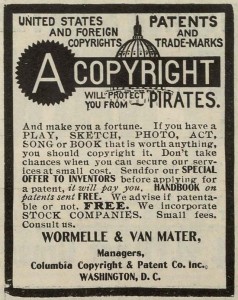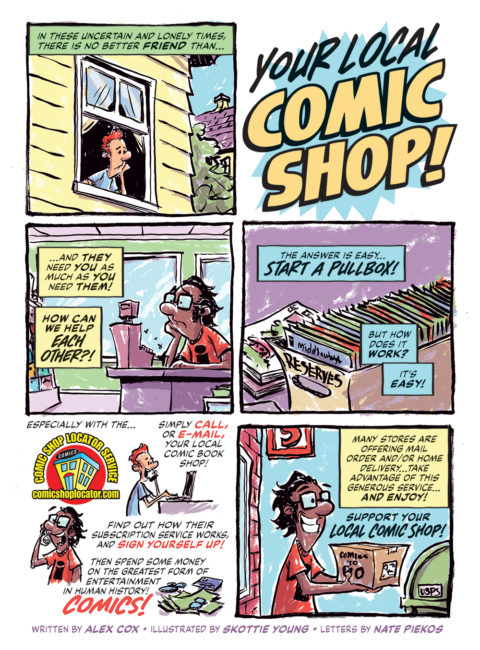This one has been brewing for several months but I needed some research; Pete’s post yesterday spurred me into action. All around the internet are scans of either full stories or full comics. I’m not talking about CBR files of last Wednesday’s issues on Torrent sites: that’s a clear case of piracy and is illegal. I’m talking here about scans of comics from the 1930s up to the 1970s; material that falls under U.S. copyright law.
Trolling the internet about copyright law isn’t as exciting as it sounds. Wikipedia provides many excellent articles but this excerpt from United States Copyright Law sums it up nicely:
All copyrightable works published in the United States before 1923 are in the public domain;[27] works created before 1978 but not published until recently may be protected until 2047.[28] For works that received their copyright before 1978, a renewal had to be filed in the work’s 28th year with the Library of Congress Copyright Office for its term of protection to be extended. The need for renewal was eliminated by the Copyright Renewal Act of 1992, but works that had already entered the public domain by non-renewal did not regain copyright protection. Therefore, works published before 1964 that were not renewed are in the public domain. With rare exception (such as very old works first published after 2002), no additional copyrights will expire (thus entering the public domain) until at least 2019 due to changes in the applicable laws.
Applying this to comics anything published before 1923 and anything published before 1964 without its copyright being renewed are public domain and free to use. Therefore anything reprinted since 1964 would be copyrighted, in a broad sense of my limited copyright understanding. What’s interesting is that it’s up to the person using the material to determine if it’s copyrighted and it’s up to the copyright holder to enforce their copyright. That’s why the recording industry funds the RIAA to enforce their copyrights; it’s labour intensive.
Marvel and DC have been around a long time and have a pretty good copyright record; reprints and collections plus timely renewals. Dark Horse, Image, Valiant, and everyone else that’s been publishing since the comics boon of the late 1970s are all covered. It’s the publishers like Dell, Gold Key and hundreds of others that could be public domain or their published material could still be copyrighted.
A site I admire and frequent regularly is The Comics Reporter, a comics blog by Tom Surgeon. Daily he links to sites that host scans of comic books, like Pappy’s Golden Age Comics Blogzine, The Big Blog Of Kids Comics, Diversions Of A Groovy Kind, The Comic Book Catacombs, Golden Age Comic Book Stories, Four Color Shadows. These sites mostly offer public domain scans of older comics but I’ve been seeing an upswing in 1970s material that is clearly copyrighted.
I checked links from the last two days on The Comics Reporter and found two items that are copyrighted material: DC Comics The Shadow issue four from 1974 and Supergraphics Comixscene issue four excerpt from 1973. The Shadow material is without a doubt not public domain and is a clear copyright violation. The Steranko story from Comixscene is also copyrighted material held by Supergraphics which I believe Steranko owns.
An interesting post was one about a Ditko story from Tales Of Suspense issue 26. They started off with scans of the original artwork that was sold from Heritage, who keeps their scans online indefinitely. That gets us into the murky depths of original art and it’s contents of copyrighted characters. They moved on to include scans of the comics pages thereby moving right into copyright violations.
Most of these blogs feel they’re providing a service, offering up comics that are hard to find. They try to cover themselves with these kind of statements:
All images are owned and © 2009 by the respective holders and are presented here for educational purposes within the “fair use” terms of US Code: Title 17, Sec. 107.
Note to “The Man”: All images are presumed copyright by the respective copyright holders and are presented here as fair use under applicable laws, man! If you hold the copyright to a work I’ve posted and would like me to remove it, just drop me an e-mail and it’s gone, baby, gone.
I appreciate the effort and since it’s up to the copyright holder to enforce at least the blog tries to comply. Here’s Title 17 section 107 of the Copyright Act:
Notwithstanding the provisions of sections 106 and 106A, the fair use of a copyrighted work, including such use by reproduction in copies or phonorecords or by any other means specified by that section, for purposes such as criticism, comment, news reporting, teaching (including multiple copies for classroom use), scholarship, or research, is not an infringement of copyright. In determining whether the use made of a work in any particular case is a fair use the factors to be considered shall include—
(1) the purpose and character of the use, including whether such use is of a commercial nature or is for nonprofit educational purposes;
(2) the nature of the copyrighted work;
(3) the amount and substantiality of the portion used in relation to the copyrighted work as a whole; and
(4) the effect of the use upon the potential market for or value of the copyrighted work.
O.K., based on this definition I can mostly go along with site posting scans of comics. If that’s the case then wouldn’t that cover any site posting scans of material no matter the age, like last month’s Green Lantern, as long as there is criticism or comment? My problem would then be defining “commercial nature”: if the site is showing ads, posting a donation link and engaging in other money-making ventures then doesn’t the site have a commercial nature?
Food for thought; give your opinions in the comments below.





Just found this: 70% Of The Public Finds Piracy Socially Acceptable. Sad really.
The 70% doesn’t surprise me. We are really talking about scale. If I decide to lend my copy of From Hell to a friend the original publisher is not making additional money. However, that is only 1 lost sale. If I post it online it could result in hundreds of thousands of lost sales, or it could create more sales. Batman the Dark Knight was the most purchased and pirated movie for the year of its release. Good stuff will sell regardless.
On an interesting side note Disney is at the forefront of changing copyright law, which makes me wonder what will happen to the Marvel Heroes when their terms expire?
I have never been in favour of downloading comics from Torrent sites and the like. I know comics can be pricey at times, and thus the consumer has to choose what they really want to invest their time and money in. If material continues to be copyrighted, then consumers should have to pay. I am pretty sure just because something is old, doesn’t mean it’s free. Just ask Disney.
Surprisingly – even though I did do that post yesterday – I’m actually not in favour of posting Scans.
With one caveat: As long as they are relatively available.
I’m a huge fan of Steranko, and maybe I should have only posted snippets, but I could not for the life of me find any other copies of the Block in any of my books. I wanted to share something that I thought was very interesting and not very well known.
One of the sites that actively got me back into comics was Scans_Daily; a community where people post a wide variety of comic scans. They’ve been busted a few times – most notably by Peter David who actually got them kicked off livejournal for posting the spoiler ending to one of his X-Factor comics.
But during a time when I was looking into getting into comics Scans Daily proved infinitely valuable for me when it came to choosing what to spend my hard earned money on.
So, truthfully I don’t really know how I feel about scans. I think posting complete stories is wrong but I think posting a few pages from it shouldn’t be considered piracy.
I really have to applaud Scott though as this is a really great article and I think an interesting debate, and I’m excited to see what others have to say… because part of me really doesn’t know how to think.
That said I’d strongly suggest picking up Comic Book Comics #5 which goes into great detail re:copyright laws and ownership disputes in comics.
I’m in favour of snippets: a page or two of a book or story to get the reader interested in the material. Every publisher posts previews of works on their websites and send out pages in their press releases.
Comic Book Daily definitely falls firmly under Title 17 section 107 “news reporting” but it’s only fair to the creators to not post a full story or comic unless we have the publisher’s permission.
Scariest snippet from that study:
“When questioned on whether it is acceptable to download something and then sell it to a friend for profit, 3 out of 4 said that would be completely unacceptable.”
A full quarter of the respondents felt that theft for profit is not worthy of condemnation. Pretty sad.
Copyright is less about the protection of ideas, but more about making money. Corporations like to claim that piracy hurts the artist but this is corporate propaganda considering they take the lions share of $$ from an artists work. Corporations are designed for the singular purpose of making money. This machine does not recognize the quality or the context of the work produced.
My personal view is, ideas are meant to be shared. Ideas fuel other ideas and enrich our existence. Good judgement and fairness should be exercised but it’s an area that cannot be regulated…
At the end of the day, it’s an honour system… But make no mistake about it… it’s not about respecting the artist or even about ethics. It’s about who should get the cash. Corporations pay governments to make the laws so who is the law going to favour? I’m no expert but I don’t think Carrie Fisher and Mark Hamill were to far off when they joked that they’d have to pay George Lucas royalties every time they looked in the mirror.
Sorry, your logic just doesn’t hold.
Let’s say “corporations” take 80% of the revenue from the sale of copyrighted work. That doesn’t make it any more justifiable for you to deprive the creator of that work of his or her 20%. You are still stealing.
You miss my point. In your example, the creator still get’s his or her 20% and no one as any interest in “depriving” the creator of anything but they do have an interest in the PROFITS. Depending on the nature of the business, the creator tends to get a set fee as per contract so corporations are peeved because they see piracy as money out of their pockets but they spin it as if it’s damaging the artist. I’m sure it does impact the artist in certain scenarios such as when royalties are involved and you can make the argument that by hurting the distributor, you indirectly hurt the artist… but most creatives that I run into are focused on their work and they are happy to have the exposure. I’m not justifying stealing… all I’m saying is that the “copyright law” is about who gets the money. If you hum a tune, should this be considered copyright infringement? Maybe by the letter of the law but because there’s is no money involved, it’s becomes a non issue. Also, many works of art and inventions are evolutionary. They are built upon previous ideas or discoveries… so who should get the credit for, ie; the electric oven which is considered to be a Canadian invention… but, if you follow the history, you realize that there were many predecessors who contributed to the development way before Thomas Ahearn came along. Also, being the first to patent an idea doesn’t make you the creator. Another example is that most Mac fanatics know that the “Mac” was started (invented?) by Jeff Raskin but because he worked for Apple and Steve Jobs took over the project, Jeff Raskin is but a little notation in Apple’s history and all ownership belongs to Apple and credited to Steve Jobs. If I lend you my dvd, am I a crook. If lend my dvd to a guy I don’t know, am I a crook? If I lend my dvd to 1,000 people that I don’t know… am I a crook? If I upload that dvd so that a million people can borrow it, am I a crook… or are the people viewing it? Most laws have good intentions but laws are also oblivious to context so this is one area of our society that will never be resolved.
BTW Marc, as side note… to me, taking 80% while the creator only get’s 20% is stealing. It just happens to be supported by a law that the corporation lobbied for.
Lending your one copy to someone else is a tried and true method to share: you purchased it and in lending temporarily transferring ownership. Making a copy and giving it away is stealing, no matter how many copies are involved.
We have laws for this because not everyone has the moral fiber to know when they’re doing wrong.
So Scott, then how do you define: Sharing, being inspired by, and stealing where ideas are concerned? In my example above, the act and the intent is the same… the only difference are the numbers. Another example (based on recently study): If you take a pen from your office, most people don’t consider this stealing… but if you take 5 boxes of pens form the office, the same people said this was stealing. Again, the action was the same… only the quantity of pens differed.
And the same answer: stealing one or one million is still stealing. Ideas and patents are very different things than copyrighted material. To be frank I don’t see how your comments have related to the article. I wrote about whether sites should be posting full stories and comics on websites without compensating the copyright holder.
It relates because posting comics or images without permission is considered a form of stealing. Ideas are at the heart of creative (which comics are based on) and patenting, like copyrighting, is a legal way to take ownership of an idea. Gotta go into a meeting… ciao.
Okay I’m back… I sense you’re getting annoyed so I’ll wrap this up but let me just say that Superman is an idea. Spiderman is an idea. And every time a creator pushes the envelope, other creator/inventors get inspired and builds on what’s been started. In the comics world, we couldn’t have Bendis’s Powers without Watchmen… or Dark… everything without the Dark Knight. True progress is built on the spirit of sharing. I don’t mind that the Dangers Girls concept is awfully similar to Charlies Angels… but I’d like to see what JSCampbell can add to the concept… otherwise it’s still Charlies Angels…
As a side note… I’m sure you guys realize that you’ll attract a bigger audience if your blogs we’re a little controversial and polarizing. A bigger audience means, more traffic which leads to more $$
^_^
We need to hire Charlie!!
That’s all very nice but in no way relates to my point, again. Please realize that patents and copyrights are two very different things.
Charlie is an idea.
I do not miss your point. I think you are wrong and missing a few important things.
You raise a bunch of semi-valid (and some I believe completely invalid) points that only serve to conflate the issue at hand.
My point is: theft is theft regardless of what justification you try to attach to it. And taking another person’s property without paying for it is theft. Scale is irrelevant. This is not only black letter law. It saddens me that a majority of people in our society either do not agree or do not care.
You use buzz words like “corporations” and try to make them sound evil because they are depriving the poor creators of their “profits” but at the same time you seem to think it’s ok to enjoy that creator’s IP without paying for it. You can’t have it both ways.
Most importantly you forget this: If people don’t pay for the (whatever is being downloaded) the artists are 100% affected regardless of whether their contract with the manufacturer gave them an advance, a flat fee, royalties, or jack squat. If the manufacturer/publisher/distributor makes no money on the project, there will be no future projects and the creator will be out of a job. This is in fact even more true if Joe Creator got paid cash upfront for his work. At least in a royalty situation there would be none to pay out based on everyone enjoying the work for free via illegal downloads.
Businesses exist to make money for the people that own them. That is their sole function. You cannot fault them for it without disagreeing with a fundamental tenet of the society you live in. If you do, that’s fine. If you want to propagate art for art’s sake, sure, share your stuff for free with everyone on the internet. Just don’t expect to make a living doing it and don’t expect the ‘corporations’ to ever do anything that doesn’t have the bottom line at the forefront.
Marc, let me make my position CLEAR by saying that I do not support or condone stealing. When something is physical, ownership is easy to define. But when something is intellectual, ownership is not so clear.
I’m trying to make the distinction that laws are separate from ethics. Laws are a set of agreed upon rules that do not and cannot take into account context. That’s why Bruce Wayne became the Batman…“the law is not justice”.
And finally, a corporation is different from a business. A corporation is not a buzz word, it is a man made machine that exists on paper. By law, they are a legal entity that have similar rights and privileges that person does.
Here’s the conundrum…
1. Where does the ownership, credit, profits, and responsibilities lie when creative is produce under employment or contract? Ie, think about why and how Image was formed.
2. If you view my DVD, is the issue ownership of the physical disk or having consumed the media? If you’ve now seen the movie that you didn’t pay for, have you stolen from the movie studio?
Think about these 2 questions… and think about it from from the point of view of the LAW and ETHICS. Because the answers (if any) will be very different.
I actually need to get some work done today but I’ll try and elaborate on the weekend so check in later…
Scott>> Patents deals with ownership and copyright deals with permission… 2 sides of the same coin if you ask me. Don’t forget about trademark… Companies like Landor who specialize in branding own certain words… like “Brand Driver”… oops, I need to add: TM
Try putting “Just Do It” all over this blog… I’m sure you’ll get a letter from Nikes legal.
Now this is a blog…
Two great examples that illustrate how your argument in no way actually deals with the article I wrote. I appreciate your need for a soapbox to stand on but at least try and relate to the post.